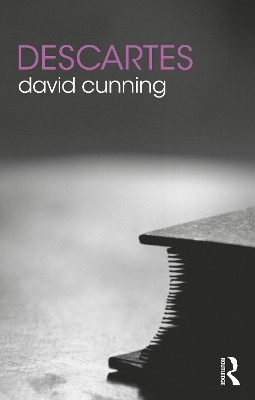
Descartes
Seiten
2023
Routledge (Verlag)
978-0-415-77505-2 (ISBN)
Routledge (Verlag)
978-0-415-77505-2 (ISBN)
An outstanding introduction to one of the greatest of Western philosophers. Including a chronology, suggestions for further reading, and a glossary of key terms, it is essential reading for anyone studying Descartes and the history of modern philosophy.
René Descartes (1596–1650) is well-known for his introspective turn away from sensible bodies and toward non-sensory ideas of mind, body, and God. Such a turn is appropriate, Descartes supposes, but only once in the course of life, and only to arrive at a more accurate picture of reality that we then incorporate in everyday embodied life.
In this clear and engaging book David Cunning introduces and examines the full range of Descartes’ philosophy. A central focus of the book is Descartes’ view that embodied human beings become more perfect to the degree that they move in the direction of finite approximations of independence, activity, immutability, and increased knowledge. Beginning with an introduction and a chapter on Descartes’ life and works, Cunning also addresses the following key topics:
Descartes on the wonders of the material universe
skepticism as epistemic garbage, and the easy dissolution of hyperbolic doubt
Descartes’ three arguments for the existence of God
the ontology of possibility and necessity
freedom and embodiment
arguments for the immateriality of mind
sensible bodies and the pragmatic certainty by which to navigate them
Descartes’ stoic view on how best to live.
Descartes is an outstanding introduction to one of the greatest of Western philosophers. Including a chronology, suggestions for further reading, and a glossary of key terms, it is essential reading for anyone studying Descartes and the history of modern philosophy.
René Descartes (1596–1650) is well-known for his introspective turn away from sensible bodies and toward non-sensory ideas of mind, body, and God. Such a turn is appropriate, Descartes supposes, but only once in the course of life, and only to arrive at a more accurate picture of reality that we then incorporate in everyday embodied life.
In this clear and engaging book David Cunning introduces and examines the full range of Descartes’ philosophy. A central focus of the book is Descartes’ view that embodied human beings become more perfect to the degree that they move in the direction of finite approximations of independence, activity, immutability, and increased knowledge. Beginning with an introduction and a chapter on Descartes’ life and works, Cunning also addresses the following key topics:
Descartes on the wonders of the material universe
skepticism as epistemic garbage, and the easy dissolution of hyperbolic doubt
Descartes’ three arguments for the existence of God
the ontology of possibility and necessity
freedom and embodiment
arguments for the immateriality of mind
sensible bodies and the pragmatic certainty by which to navigate them
Descartes’ stoic view on how best to live.
Descartes is an outstanding introduction to one of the greatest of Western philosophers. Including a chronology, suggestions for further reading, and a glossary of key terms, it is essential reading for anyone studying Descartes and the history of modern philosophy.
David Cunning is Professor of Philosophy at the University of Iowa, USA.
Chronology 1. Introduction: The Very Big Picture 2. Life and Works 3. The Limits of Our Metaphysical Tether 4. Skepticism 5. Arguments for the Existence of God 6. Human Freedom 7. Immaterial Minds 8. External Bodies and Sufficient Certainty for Application to Ordinary Life 9. How Best to Live 10. Conclusion. Glossary Bibliography Index
| Erscheint lt. Verlag | 1.8.2023 |
|---|---|
| Reihe/Serie | The Routledge Philosophers |
| Verlagsort | London |
| Sprache | englisch |
| Maße | 138 x 216 mm |
| Gewicht | 780 g |
| Themenwelt | Geisteswissenschaften ► Philosophie ► Erkenntnistheorie / Wissenschaftstheorie |
| Geisteswissenschaften ► Philosophie ► Metaphysik / Ontologie | |
| Geisteswissenschaften ► Philosophie ► Philosophie der Neuzeit | |
| ISBN-10 | 0-415-77505-1 / 0415775051 |
| ISBN-13 | 978-0-415-77505-2 / 9780415775052 |
| Zustand | Neuware |
| Informationen gemäß Produktsicherheitsverordnung (GPSR) | |
| Haben Sie eine Frage zum Produkt? |
Mehr entdecken
aus dem Bereich
aus dem Bereich
Buch | Softcover (2023)
Reclam, Philipp (Verlag)
CHF 9,80
![Was heißt Denken?. Vorlesung Wintersemester 1951/52. [Was bedeutet das alles?] - Martin Heidegger](/media/113619842)

